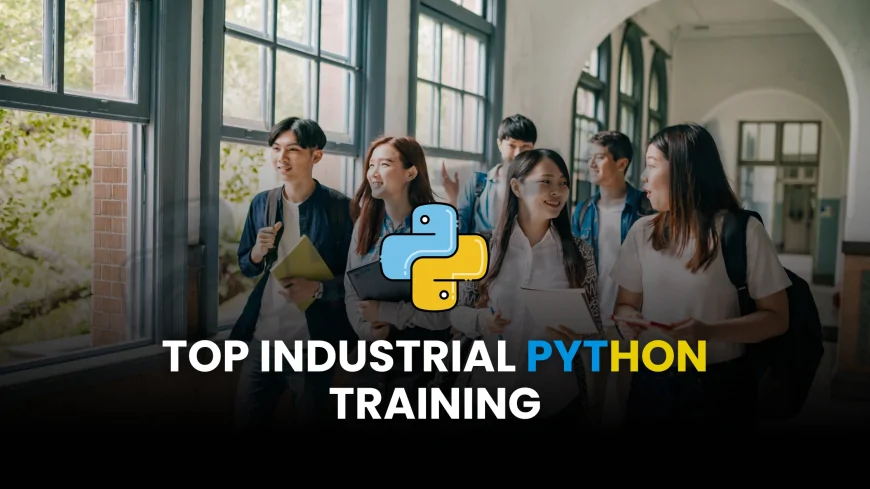Best Industrial Python Training Programs in Pune | Python Training with Industrial Applications in Pune
Explore the best industrial Python training programs in Pune designed for engineers, professionals, and job seekers. Gain real-world skills through hands-on projects, live sessions, and certification courses tailored for industry readiness.

Table of Contents
- Introduction
- What Makes Python “Industrial-Grade”?
- Why Pune Leads in Industrial Python Upskilling
- Rigorous Criteria Used to Rank Programs
- Top Industrial Python Training Programs in Pune
- Side-by-Side Program Comparison
- Deep-Dive: Core & Domain-Specific Curriculum
- Delivery Models: On-Campus, Hybrid, On-Site & Online Live
- Flagship Real-World Projects & Lab Infrastructure
- Global & National Certifications You Can Earn
- Faculty & Industry Mentors
- Fees, EMI Plans & Corporate Sponsorships
- Placement Records & Industry Tie-Ups
- ROI: Salary Uplift & Career Trajectory Post-Completion
- Tips to Maximise Learning and Networking
- Emerging Trends Shaping Industrial Python in 2025 & Beyond
- FAQs
- Conclusion
Introduction
Industrial Python is no longer a buzz-word reserved for tech giants; it is now the backbone of automation on factory floors, predictive maintenance in smart manufacturing, data-driven quality control in pharmaceuticals, and digital twins in automotive R&D. Pune—India’s manufacturing and IT powerhouse—has responded with a rich ecosystem of specialised training programs that merge hardcore software engineering with domain knowledge in mechanical, electrical, electronics, process, and industrial engineering.
What Makes Python “Industrial-Grade”?
While vanilla Python focuses on language syntax and general-purpose scripting, an industrial Python program layers in:
- Automation Frameworks (PyAutoGUI, Robot Framework, OPC-UA bindings)
- Data Acquisition & SCADA Integration (Modbus, MQTT, CAN-BUS adapters)
- Edge-AI & IIoT Packages (TensorFlow Lite, OpenCV on Raspberry Pi / Jetson)
- DevOps, CI/CD & Containerisation (Docker, Buildroot, Yocto)
- Safety-Critical Coding Standards (PEP 8 ++, MISRA-inspired guidelines)
These elements ensure code reliability, real-time performance, and seamless integration with legacy PLC-driven environments.
Why Pune Leads in Industrial Python Upskilling
- Manufacturing Hub: Over 10,000 MSMEs, 300 + auto-ancillary units, and mega plants of Tata Motors, Bajaj, Honeywell, and Cummins create constant demand for automation talent.
- IT & Embedded Ecosystem: Hinjawadi and Talawade IT parks host firms building OEM dashboards, analytics, and MES solutions in Python.
- Academic Synergy: COEP Tech, VIT, Symbiosis, and PICT collaborate with training centres for internship pipelines.
- Startup Culture: Pune has 500 + deep-tech startups—from drones to EV BMS—where industrial Python is pivotal.
Rigorous Criteria Used to Rank Programs
To ensure objectivity, each course on our list was scored against eight weighted parameters:
- Curriculum Depth (20 %)
- Hands-on Project Hours (20 %)
- Faculty Industry Experience (15 %)
- Infrastructure & Lab Access (10 %)
- Certification & Accreditation (10 %)
- Placement Record & Salary Hike (10 %)
- Student-to-Mentor Ratio (10 %)
- Flexibility & Delivery Modes (5 %)
Top Industrial Python Training Programs in Pune
Webasha Technologies :
In Pune offers a hands-on Industrial Python Training Program tailored for engineers and working professionals in manufacturing, automation, and IIoT (Industrial Internet of Things). The course blends Python scripting with industrial use cases like data logging, predictive maintenance, PLC data communication, and SCADA dashboard automation. Participants work on OPC-UA integrations, sensor data processing, and simulated plant environments.
Highlights:
Python + Industrial Automation toolchain
OPC-UA / Modbus data interface projects
Hands-on with SCADA, Raspberry Pi, and edge devices
Domain-specific mini-projects in process, energy, and control systems
Industry-recognized completion certificate
This program is ideal for engineering students, automation specialists, and technical professionals looking to bridge the gap between programming and plant operations.
Side-by-Side Program Comparison
| Component | Details |
|---|---|
| Registration Fee | ₹500 (One-time, non-refundable) |
| Total Course Fee | ₹22,000 – ₹28,000 |
| Duration | 8–10 Weeks (45 Sessions) |
| Batch Types | Weekday / Weekend / Fast-Track |
| Mode | Offline (Kothrud, Hinjewadi) / Online |
| Installments Option | Yes (Up to 3 EMIs at 0% interest) |
| Group Discount | 10% off for groups of 3+ participants |
| Certification Fee (if any) | Included in total fee |
| Internship Project Support | Free with course |
Special Offer: Students from engineering backgrounds or recent graduates may receive up to 15% scholarship on early enrollment.
Deep-Dive: Core & Domain-Specific Curriculum
Core Modules (applies to all programs)
- Advanced Python (OO design patterns, decorators, context managers)
- NumPy, Pandas, and Performance Optimisation (Cython / Numba)
- Version Control, GitLab CI, Docker Basics
- Testing & Static Analysis (pytest, mypy, Pylint Industrial)
Specialised Tracks
| Track | Key Topics |
|---|---|
| Automation & Robotics | Modbus TCP, ROS2, pySerial, robotic arm kinematics |
| Industrial Data Science | Time-series analysis, anomaly detection, AutoML ops |
| Embedded & Edge-AI | MicroPython, circuit Python, cross-compilation, Jetson Nano |
| Digital Twins | SimPy, CAD API scripting, WebGL visualisation |
Delivery Models: On-Campus, Hybrid, On-Site & Online Live
Pune institutes have embraced flexible learning. Working professionals often prefer weekend hybrid schedules, while corporate HR departments opt for on-site bespoke cohorts that map the syllabus directly onto plant use cases. Online live classes, meanwhile, allow remote engineers from Chakan or Ranjangaon plants to learn without commute downtime.
Flagship Real-World Projects & Lab Infrastructure
- CNC Anomaly Dashboard: live sensor feed → InfluxDB → Grafana → predictive alerts in Slack.
- Pick-and-Place Robot: UR5 arm controlled via Python API, integrated with a vision pipeline.
- Smart HVAC Automation: Raspberry Pi Zigbee gateway controlling industrial chillers via PID loops.
- Oil-&-Gas Pipeline Leak Detection: ML model consuming SCADA telemetry, raising Telegram alerts.
Global & National Certifications You Can Earn
- Certified Industrial Python Engineer (CIPE)
- PLCnext Python Integrator (Phoenix Contact partnership)
- IoT Edge Developer – Python (Cisco Networking Academy)
- ROS2 Industrial Automation Specialist
Many Pune centres are authorised Pearson VUE testing hubs, letting you sit the exams on campus.
Faculty & Industry Mentors
Most trainers are ex-automation or data-science leads from OEMs like Siemens, Bosch, and Bharat Forge. Guest lectures come from COEP Tech professors and startup CTOs who walk through case studies on battery-pack monitoring or AGV navigation.
Fees, EMI Plans & Corporate Sponsorships
Average tuition ranges from ₹24 000 to ₹35 000. Nearly every institute partners with Bajaj Finserv / HDFC Credila for 0 % EMI over 6–12 months. Corporate tie-ups can subsidise up to 80 % of fees for bulk enrolments, particularly under government Skill India 4.0 grants.
Placement Records & Industry Tie-Ups
- Average salary hike: 38 % within six months of graduation
- Hiring partners: Tata Technologies, Bosch, KPIT, Faurecia, John Deere, Thermax
- Typical roles: Python Automation Engineer, IoT Edge Developer, Industrial Data Analyst, MES Integration Specialist
ROI: Salary Uplift & Career Trajectory Post-Completion
Entry-level engineers (₹3 L CTC) often transition to mid-level roles (₹5–7 L) within a year. Senior technicians with heavy-equipment experience can pivot into Automation Specialist roles (₹8 L + OT) by showcasing SCADA scripting proficiency. Data-centric professionals may jump to ₹10 L + packages in predictive maintenance or quality analytics teams.
Tips to Maximise Learning and Networking
- Attend at least two industry meet-ups at MCCIA Pune to showcase project demos.
- Contribute to open-source IIoT libraries (e.g.,
opcua-asyncio)—looks stellar on a résumé. - Document plant POCs on GitHub with screenshots and logs to discuss at interviews.
- Network on LinkedIn groups such as “Pune Industrial Automation Professionals”.
Emerging Trends Shaping Industrial Python in 2025 & Beyond
- Python on RISC-V microcontrollers driving ultra-low-power sensors.
- Self-healing MES pipelines using reinforcement learning agents.
- No-code dashboards (e.g., Streamlit Cloud) replacing traditional HMI in brown-field plants.
- 5G MPN (Mobile Private Networks) enabling real-time Python micro-services on the shop-floor edge.
Frequently Asked Questions
1. Who should enrol in an industrial Python program?
Mechanical, electrical, electronics, instrumentation engineers, data analysts, and even floor supervisors aiming to automate workflows.
2. What programming background is required?
Basic knowledge of any language is helpful, but most courses start with Python fundamentals before diving into industrial modules.
3. Are these programs recognised by employers?
Yes—many have MoUs with OEMs and issue certificates co-signed by industry bodies like NASSCOM Futureskills.
4. Can the training be customised for a specific plant use-case?
Absolutely. Institutes such as PRWATECH and Technogeeks conduct on-site cohorts after mapping client requirements.
5. How much coding vs. hardware does the syllabus cover?
Expect roughly 70 % Python coding (scripts, APIs) and 30 % hardware interaction (PLC simulators, sensors).
6. What hardware kits are provided?
Raspberry Pi 4, Jetson Nano, or ESP32 kits plus USB-to-RS485 adapters and I/O extension boards.
7. Are weekend-only batches available?
Yes—most institutes run Saturday-Sunday classes for working professionals.
8. Do programs cover data visualisation?
Yes—Plotly Dash, Grafana, and custom Django dashboards are standard modules.
9. What is the average class size?
15 – 20 learners per batch, ensuring individual mentorship.
10. Is remote lab access provided?
Many centres host VPN-based lab access so you can SSH into PLC simulators and IoT gateways anytime.
11. How are assessments conducted?
Weekly quizzes, project code reviews, and a capstone demonstration in front of an external panel.
12. Do I get lifetime access to course material?
Yes—slide decks, code repositories, and recorded lectures remain accessible via the LMS.
13. What is the refund policy?
Typically a full refund within the first two sessions if dissatisfied, subject to each institute’s T&C.
14. Are EMI options interest-free?
Yes—0 % interest for 6 months; 12-month plans may carry a 2 % processing fee.
15. Can I pursue global certifications like CIPE afterwards?
Yes—the program preps you for these exams, and test centres in Pune facilitate scheduling.
16. Are internships part of the curriculum?
Some institutes partner with SMEs for 4-week mini-internships post-training.
17. How soon can I expect a salary hike?
Within 3–6 months, contingent on showcasing project impact during appraisals.
18. Does the course include soft-skills training?
Presentation skills, technical writing, and interview prep are often integrated into the final module.
19. Is Python the only language taught?
Primary focus is Python, but bash scripting and minimal C extensions are covered for performance tuning.
20. How do I enrol?
Visit the respective institute’s website, request a counselling call, attend a free demo class, and complete the online registration with fee payment.
Conclusion
Industrial Python training in Pune has matured from generic coding bootcamps to domain-driven, project-heavy programs that deliver job-ready talent to factories, labs, and R&D centres. Whether you are a fresh engineering graduate or an experienced maintenance engineer pivoting to Industry 4.0, the courses listed above offer meticulously curated content, robust lab access, seasoned mentors, and verified placement support. Enrol today to automate tomorrow!
What's Your Reaction?
 Like
0
Like
0
 Dislike
0
Dislike
0
 Love
0
Love
0
 Funny
0
Funny
0
 Angry
0
Angry
0
 Sad
0
Sad
0
 Wow
0
Wow
0














